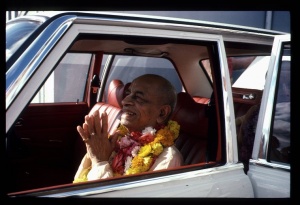SB 8.23.22-23: Difference between revisions
m (1 revision(s)) |
(Vanibot #0054 edit - transform synonyms into clickable links, which search similar occurrences) |
||
| (One intermediate revision by one other user not shown) | |||
| Line 1: | Line 1: | ||
{{info | {{info | ||
|speaker= | |speaker=Śukadeva Gosvāmī | ||
|listener=King | |listener=King Parīkṣit | ||
}} | }} | ||
[[Category:Srimad-Bhagavatam - Canto 08 Chapter 23]] | |||
[[Category:Bhagavatam Verses Spoken by Sukadeva Gosvami - Vanisource|082322]] | |||
<div style="float:left">'''[[Srimad-Bhagavatam]] - [[SB 8|Eighth Canto]] - [[SB 8.23: The Demigods Regain the Heavenly Planets|Chapter 23: The Demigods Regain the Heavenly Planets]]'''</div> | |||
<div style="float:right">[[File:Go-previous.png|link=SB 8.23.20-21]] '''[[SB 8.23.20-21]] - [[SB 8.23.24]]''' [[File:Go-next.png|link=SB 8.23.24]]</div> | |||
{{RandomImage}} | |||
==== TEXTS 22-23 ==== | ==== TEXTS 22-23 ==== | ||
<div | <div class="verse"> | ||
vedānāṁ sarva-devānāṁ | :vedānāṁ sarva-devānāṁ | ||
dharmasya yaśasaḥ śriyaḥ | :dharmasya yaśasaḥ śriyaḥ | ||
maṅgalānāṁ vratānāṁ ca | :maṅgalānāṁ vratānāṁ ca | ||
kalpaṁ svargāpavargayoḥ | :kalpaṁ svargāpavargayoḥ | ||
upendraṁ kalpayāṁ cakre | |||
patiṁ sarva-vibhūtaye | :upendraṁ kalpayāṁ cakre | ||
tadā sarvāṇi bhūtāni | :patiṁ sarva-vibhūtaye | ||
bhṛśaṁ mumudire nṛpa | :tadā sarvāṇi bhūtāni | ||
:bhṛśaṁ mumudire nṛpa | |||
</div> | </div> | ||
| Line 21: | Line 27: | ||
==== SYNONYMS ==== | ==== SYNONYMS ==== | ||
<div | <div class="synonyms"> | ||
''[//vanipedia.org/wiki/Special:VaniSearch?s=vedānām&tab=syno_o&ds=1 vedānām]'' — (for the protection) of all the Vedas; ''[//vanipedia.org/wiki/Special:VaniSearch?s=sarva&tab=syno_o&ds=1 sarva]-[//vanipedia.org/wiki/Special:VaniSearch?s=devānām&tab=syno_o&ds=1 devānām]'' — of all the demigods; ''[//vanipedia.org/wiki/Special:VaniSearch?s=dharmasya&tab=syno_o&ds=1 dharmasya]'' — of all principles of religion; ''[//vanipedia.org/wiki/Special:VaniSearch?s=yaśasaḥ&tab=syno_o&ds=1 yaśasaḥ]'' — of all fame; ''[//vanipedia.org/wiki/Special:VaniSearch?s=śriyaḥ&tab=syno_o&ds=1 śriyaḥ]'' — of all opulences; ''[//vanipedia.org/wiki/Special:VaniSearch?s=maṅgalānām&tab=syno_o&ds=1 maṅgalānām]'' — of all auspiciousness; ''[//vanipedia.org/wiki/Special:VaniSearch?s=vratānām&tab=syno_o&ds=1 vratānām] [//vanipedia.org/wiki/Special:VaniSearch?s=ca&tab=syno_o&ds=1 ca]'' — and of all vows; ''[//vanipedia.org/wiki/Special:VaniSearch?s=kalpam&tab=syno_o&ds=1 kalpam]'' — the most expert; ''[//vanipedia.org/wiki/Special:VaniSearch?s=svarga&tab=syno_o&ds=1 svarga]-[//vanipedia.org/wiki/Special:VaniSearch?s=apavargayoḥ&tab=syno_o&ds=1 apavargayoḥ]'' — of elevation to the heavenly planets or liberation from material bondage; ''[//vanipedia.org/wiki/Special:VaniSearch?s=upendram&tab=syno_o&ds=1 upendram]'' — Lord Vāmanadeva; ''[//vanipedia.org/wiki/Special:VaniSearch?s=kalpayām&tab=syno_o&ds=1 kalpayām] [//vanipedia.org/wiki/Special:VaniSearch?s=cakre&tab=syno_o&ds=1 cakre]'' — they made it the plan; ''[//vanipedia.org/wiki/Special:VaniSearch?s=patim&tab=syno_o&ds=1 patim]'' — the master; ''[//vanipedia.org/wiki/Special:VaniSearch?s=sarva&tab=syno_o&ds=1 sarva]-[//vanipedia.org/wiki/Special:VaniSearch?s=vibhūtaye&tab=syno_o&ds=1 vibhūtaye]'' — for all purposes; ''[//vanipedia.org/wiki/Special:VaniSearch?s=tadā&tab=syno_o&ds=1 tadā]'' — at that time; ''[//vanipedia.org/wiki/Special:VaniSearch?s=sarvāṇi&tab=syno_o&ds=1 sarvāṇi]'' — all; ''[//vanipedia.org/wiki/Special:VaniSearch?s=bhūtāni&tab=syno_o&ds=1 bhūtāni]'' — living entities; ''[//vanipedia.org/wiki/Special:VaniSearch?s=bhṛśam&tab=syno_o&ds=1 bhṛśam]'' — very much; ''[//vanipedia.org/wiki/Special:VaniSearch?s=mumudire&tab=syno_o&ds=1 mumudire]'' — became happy; ''[//vanipedia.org/wiki/Special:VaniSearch?s=nṛpa&tab=syno_o&ds=1 nṛpa]'' — O King. | |||
</div> | </div> | ||
| Line 28: | Line 34: | ||
==== TRANSLATION ==== | ==== TRANSLATION ==== | ||
<div | <div class="translation"> | ||
O King Parīkṣit, Indra was considered the King of all the universe, but the demigods, headed by Lord Brahmā, wanted Upendra, Lord Vāmanadeva, as the protector of the Vedas, the principles of religion, fame, opulence, auspiciousness, vows, elevation to the higher planetary system, and liberation. Thus they accepted Upendra, Lord Vāmanadeva, as the supreme master of everything. This decision made all living entities extremely happy. | O King Parīkṣit, Indra was considered the King of all the universe, but the demigods, headed by Lord Brahmā, wanted Upendra, Lord Vāmanadeva, as the protector of the Vedas, the principles of religion, fame, opulence, auspiciousness, vows, elevation to the higher planetary system, and liberation. Thus they accepted Upendra, Lord Vāmanadeva, as the supreme master of everything. This decision made all living entities extremely happy. | ||
</div> | </div> | ||
__NOTOC__ | |||
<div style="float:right; clear:both;">[[File:Go-previous.png|link=SB 8.23.20-21]] '''[[SB 8.23.20-21]] - [[SB 8.23.24]]''' [[File:Go-next.png|link=SB 8.23.24]]</div> | |||
__NOTOC__ | |||
__NOEDITSECTION__ | |||
Latest revision as of 23:27, 18 February 2024

A.C. Bhaktivedanta Swami Prabhupada
TEXTS 22-23
- vedānāṁ sarva-devānāṁ
- dharmasya yaśasaḥ śriyaḥ
- maṅgalānāṁ vratānāṁ ca
- kalpaṁ svargāpavargayoḥ
- upendraṁ kalpayāṁ cakre
- patiṁ sarva-vibhūtaye
- tadā sarvāṇi bhūtāni
- bhṛśaṁ mumudire nṛpa
SYNONYMS
vedānām — (for the protection) of all the Vedas; sarva-devānām — of all the demigods; dharmasya — of all principles of religion; yaśasaḥ — of all fame; śriyaḥ — of all opulences; maṅgalānām — of all auspiciousness; vratānām ca — and of all vows; kalpam — the most expert; svarga-apavargayoḥ — of elevation to the heavenly planets or liberation from material bondage; upendram — Lord Vāmanadeva; kalpayām cakre — they made it the plan; patim — the master; sarva-vibhūtaye — for all purposes; tadā — at that time; sarvāṇi — all; bhūtāni — living entities; bhṛśam — very much; mumudire — became happy; nṛpa — O King.
TRANSLATION
O King Parīkṣit, Indra was considered the King of all the universe, but the demigods, headed by Lord Brahmā, wanted Upendra, Lord Vāmanadeva, as the protector of the Vedas, the principles of religion, fame, opulence, auspiciousness, vows, elevation to the higher planetary system, and liberation. Thus they accepted Upendra, Lord Vāmanadeva, as the supreme master of everything. This decision made all living entities extremely happy.